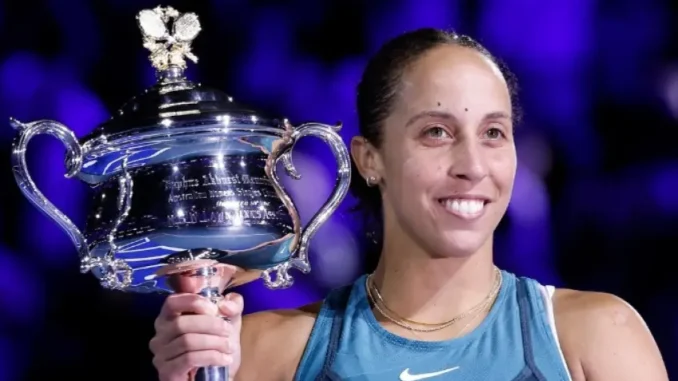
In a remarkable display of resilience and determination, Madison Keys clinched her first Grand Slam title at the Australian Open, overcoming world number one Aryna Sabalenka in a thrilling three-set final.
The match, which culminated in a 6-3, 2-6, 7-5 victory for Keys, not only marked a career milestone but also highlighted her journey through personal and professional challenges.
Keys, 29, had long been touted as a future star in tennis, possessing a powerful serve and formidable groundstrokes. Her athleticism and on-court prowess were evident from an early age, leading many to anticipate her ascent to Grand Slam glory. However, the path was fraught with obstacles, including a crushing defeat in the 2017 US Open final and subsequent semifinal exits in major tournaments.
Reflecting on her journey, Keys acknowledged the immense pressure she felt to secure a Grand Slam title. “From a pretty young age, I felt like if I never won a Grand Slam, then I wouldn’t have lived up to what people thought I should have been. That was a pretty heavy burden to kind of carry around,” she admitted. It was only after embracing the possibility of never winning a major and finding contentment in her efforts that she unlocked her potential. “I finally got to the point where I was proud of myself and proud of my career, with or without a Grand Slam,” Keys shared.
This mental shift was facilitated through therapy, which Keys credits for her newfound perspective. “I honestly think that had I not done that, then I wouldn’t be sitting here,” she stated, emphasizing the importance of mental health in her athletic performance. This internal transformation translated into a more relaxed and confident demeanor on the court, allowing her to navigate high-pressure situations with composure.
The Australian Open final was a testament to Keys’ resilience. Facing Sabalenka, a two-time defending champion at Melbourne Park, Keys delivered a performance characterized by strategic precision and mental fortitude. She secured three breaks in the first set, capitalizing on Sabalenka’s unforced errors. Despite a dip in momentum during the second set, Keys maintained her focus, ultimately clinching the match with a decisive forehand winner.
The victory was not just a personal triumph but also a significant moment in tennis history. Keys became the oldest woman to win her first Grand Slam title since Flavia Pennetta in 2015, achieving this feat in her 46th major appearance. Her journey underscores the importance of perseverance and mental resilience in professional sports.
However, the euphoria of her Grand Slam victory was soon overshadowed by controversy. Reports emerged alleging irregularities in the drug testing protocols at the Miami Open, suggesting that players were allowed to schedule their blood tests, a practice that could potentially enable doping. Keys vehemently refuted these claims, taking to social media to clarify the situation. “They use ‘booked’ blood passport samples as a baseline to test future samples against. I was woken up at 6:30 am literally 3 days ago for an unscheduled doping test. Don’t spread fake bullshit,” she asserted.
Fellow players, including Andrea Petkovic, supported Keys’ stance, explaining that scheduled tests are standard practice for establishing baseline readings, while unscheduled tests are conducted to detect any anomalies. This incident highlights the ongoing challenges athletes face in maintaining their reputations amidst stringent anti-doping regulations.
Keys’ journey to Grand Slam success was further complicated by health issues. Following the Australian Open, she battled shingles in her mouth, which left her unable to eat for three weeks, resulting in a significant weight loss of 15 pounds. “I have no muscle, I’m so tired all the time,” she revealed, discussing the toll it took on her body. Despite these setbacks, Keys demonstrated remarkable resilience, returning to competition and securing victories, including a notable win at the Rome Open.
Her triumph at the Australian Open and subsequent challenges underscore the multifaceted nature of an athlete’s journey. Keys’ story is one of talent, perseverance, and an unwavering commitment to personal growth. As she continues her career, she serves as an inspiration to aspiring athletes, exemplifying that success is not solely defined by titles but also by the resilience and integrity displayed along the way.
In the aftermath of her Grand Slam victory, Keys reflected on her journey with a sense of fulfillment. “I didn’t always believe that I could get back to this point,” she admitted. “But to be able to do it and win, it means the world to me.” Her story is a powerful reminder that the path to success is rarely linear, and true achievement encompasses both personal and professional growth.
Leave a Reply